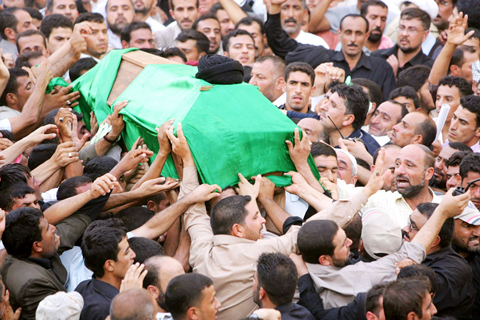Abdul Aziz al-Hakim, one of Iraq’s most powerful Shiite Muslim leaders, was buried in the holy city of Najaf on Saturday, three days after his death cast more uncertainty over Iraq’s turbulent politics.
Hakim, 59, a popular cleric who headed the powerful Shiite Supreme Islamic Iraqi Council (ISCI), died on Wednesday in Tehran, where he was being treated for lung cancer.
He was buried beside his elder brother Muhammad Baqer al-Hakim, who was killed in a 2003 bombing that was claimed by al-Qaeda. Hakim took charge of ISCI from his brother.

PHOTO: EPA
Thousands of Hakim’s supporters in black or white robes thronged streets beside a motorcade carrying his coffin to the burial site.
They waved green flags and held banners. One read: “Goodbye, Abu Ammar,” an affectionate name for the cleric.
Some prayed, others beat their heads and chests with their hands in a traditional mourning ritual. One of his aides placed his trademark black turban on the car’s roof.
Supporters carried his coffin, wrapped in a green shroud to the Imam Ali Shrine, one of Shiite Islam’s holiest sites. He was interred in a cemetery about 1.5km away.
“Iraq has lost someone who can never be replaced,” 39-year-old government employee Ali Mohammed Abbas said. “He was a national and religious figure and a guide for all Iraqi people.”
ISCI last Monday said it would lead a new, mostly Shiite alliance to compete in January’s national polls without Iraqi Prime Minister Nuri al-Maliki’s small Dawa party, raising questions about possible disunity amongst Iraq’s Shiite majority.
Hakim’s son, Ammar al-Hakim, who has been groomed to take over ISCI but may yet face internal leadership challenges, has urged those outside the new alliance to join it.
ISCI was founded in Iran in exile during the rule of former Iraqi president Saddam Hussein, a Sunni. It has close ties to Iran’s rulers.
Iranian Foreign Minister Manouchehr Mottaki said in Iraq: “[Hakim’s] death is a loss for the political process. His eminence made sacrifices to liberate Iraq from dictatorship.”
ISCI derives much support from the Hakim family name, revered among Shiites for its lineage of scholars and sacrifice in the face of assaults by Saddam and other violence. Saddam killed eight of Hakim’s brothers and many more of his family.
ISCI and Maliki’s Dawa party swept to power in 2005 polls as part of a broad Shiite coalition, but over the past year wrangling over alliances has intensified.
Violence has fallen overall in Iraq, but a spike in major attacks in the past month is expected to continue ahead of the polls and as US forces prepare to withdraw by the end of 2011.

POLITICAL PRISONERS VS DEPORTEES: Venezuela’s prosecutor’s office slammed the call by El Salvador’s leader, accusing him of crimes against humanity Salvadoran President Nayib Bukele on Sunday proposed carrying out a prisoner swap with Venezuela, suggesting he would exchange Venezuelan deportees from the US his government has kept imprisoned for what he called “political prisoners” in Venezuela. In a post on X, directed at Venezuelan President Nicolas Maduro, Bukele listed off a number of family members of high-level opposition figures in Venezuela, journalists and activists detained during the South American government’s electoral crackdown last year. “The only reason they are imprisoned is for having opposed you and your electoral fraud,” he wrote to Maduro. “However, I want to propose a humanitarian agreement that

ECONOMIC WORRIES: The ruling PAP faces voters amid concerns that the city-state faces the possibility of a recession and job losses amid Washington’s tariffs Singapore yesterday finalized contestants for its general election on Saturday next week, with the ruling People’s Action Party (PAP) fielding 32 new candidates in the biggest refresh of the party that has ruled the city-state since independence in 1965. The move follows a pledge by Singaporean Prime Minister Lawrence Wong (黃循財), who took office last year and assumed the PAP leadership, to “bring in new blood, new ideas and new energy” to steer the country of 6 million people. His latest shake-up beats that of predecessors Lee Hsien Loong (李顯龍) and Goh Chok Tong (吳作棟), who replaced 24 and 11 politicians respectively

Young women standing idly around a park in Tokyo’s west suggest that a giant statue of Godzilla is not the only attraction for a record number of foreign tourists. Their faces lit by the cold glow of their phones, the women lining Okubo Park are evidence that sex tourism has developed as a dark flipside to the bustling Kabukicho nightlife district. Increasing numbers of foreign men are flocking to the area after seeing videos on social media. One of the women said that the area near Kabukicho, where Godzilla rumbles and belches smoke atop a cinema, has become a “real

‘WATER WARFARE’: A Pakistani official called India’s suspension of a 65-year-old treaty on the sharing of waters from the Indus River ‘a cowardly, illegal move’ Pakistan yesterday canceled visas for Indian nationals, closed its airspace for all Indian-owned or operated airlines, and suspended all trade with India, including to and from any third country. The retaliatory measures follow India’s decision to suspend visas for Pakistani nationals in the aftermath of a deadly attack by shooters in Kashmir that killed 26 people, mostly tourists. The rare attack on civilians shocked and outraged India and prompted calls for action against their country’s archenemy, Pakistan. New Delhi did not publicly produce evidence connecting the attack to its neighbor, but said it had “cross-border” links to Pakistan. Pakistan denied any connection to